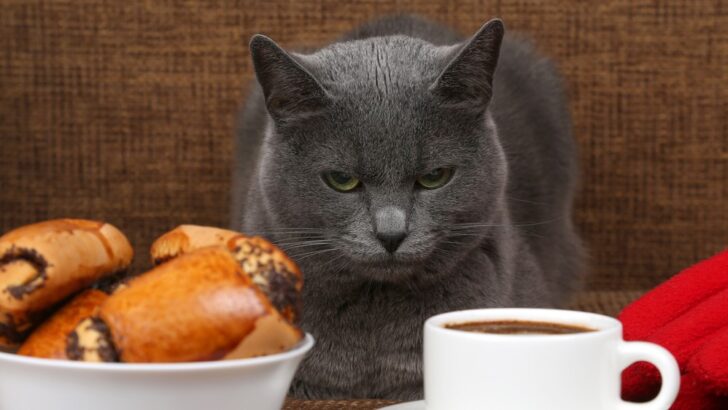“I was preparing the ingredients for my grandma’s famous poppy seed cake when I saw my kitty sniffing around the poppy seed bag. I’m not sure if she had eaten any, but I’m so worried. Aria, please help me: Can cats eat poppy seeds? Are they safe?”
I received this message a couple of days ago from one of my closest friends and fellow cat mom. And I have to admit – I never wondered about this topic myself.
For me personally, poppy seeds are something very distant. I don’t prefer the taste of them in cakes, and I don’t bother putting them on the bread that I bake. Our paths very rarely cross.
So I have to admit, this was a very interesting matter to research.
So, can cats eat poppy seeds? Are the seeds from that beautiful wild red flower safe for our beloved feline companions? Can they munch on them without a single worry in the world? Or do we as their owners have to be more careful?
Let’s find out!
Poppy seeds 101: Everything you need to know
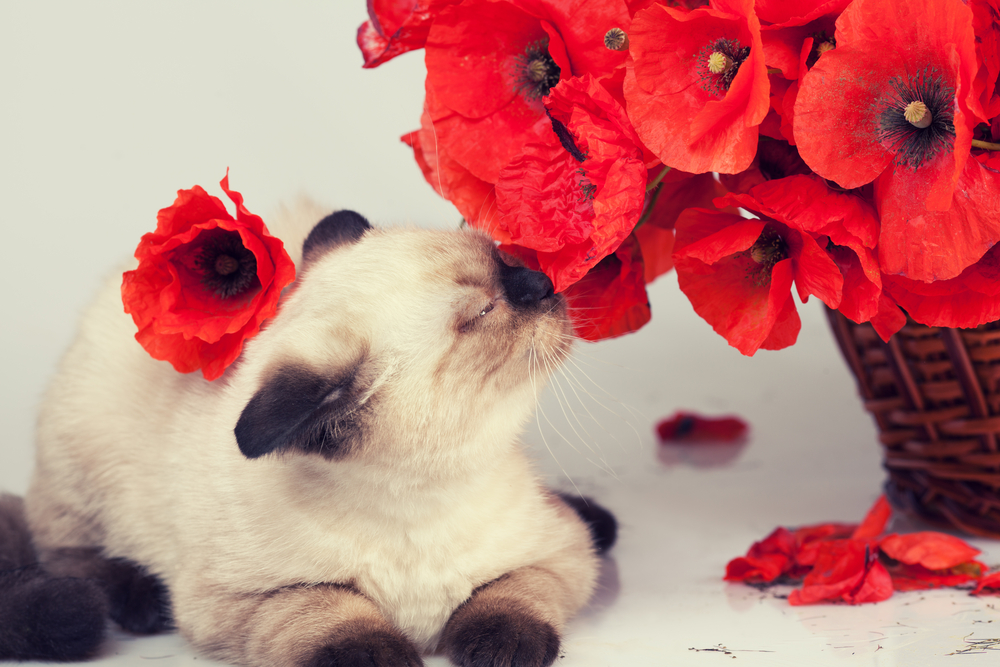
Poppy seeds are small blackish or grayish seeds obtained from the poppy flower called Papaver somniferum, where “somniferum” in Latin means “sleep bringing.” These seeds are packed with strong opiates which can be used in the production of certain drugs, like opium or heroin.
Throughout the years, many cultures and civilizations have used poppy seeds in their everyday lives.
Around 1550 BC, poppy seeds were mentioned in the Ebers Papyrus, an Egyptian medical papyrus scroll of herbal knowledge, as one of the sedatives. The Minoan civilization from Crete used these seeds mixed with milk, and honey to make a calming potion for crying babies.
Today, we use these seeds mostly when baking and cooking in order to add some flavor and texture to our meals and baked goods. Some people also use them to make poppy tea which has great pain-relieving properties.
Many people believe that poppy seeds contain small amounts of opiates, called alkaloids, which are so powerful that they can weaken our nervous system and cause drowsiness. This, however, is not entirely true.
Poppy seeds can during harvesting get contaminated with opiates which can be found in the milky latex of the seed pod that’s covering them.
The concentration of opiates depends on two factors. The first one is determined by the terroir of the seeds, which includes the soil, climate, amount of sunshine, topography, and the time of harvest.
The second factor is the variety of the plant. Some poppy plants don’t contain any morphine or codeine (the strong opiates), and they don’t produce any amount of opium.
Washing, cooking, or baking these seeds significantly decreases their opiate content. So, technically speaking, people cannot get intoxicated by consuming poppy seeds.
However, despite us being relatively safe from these seeds, it might not be the same for our feline friends. Let’s find out more!
Can cats eat poppy seeds?
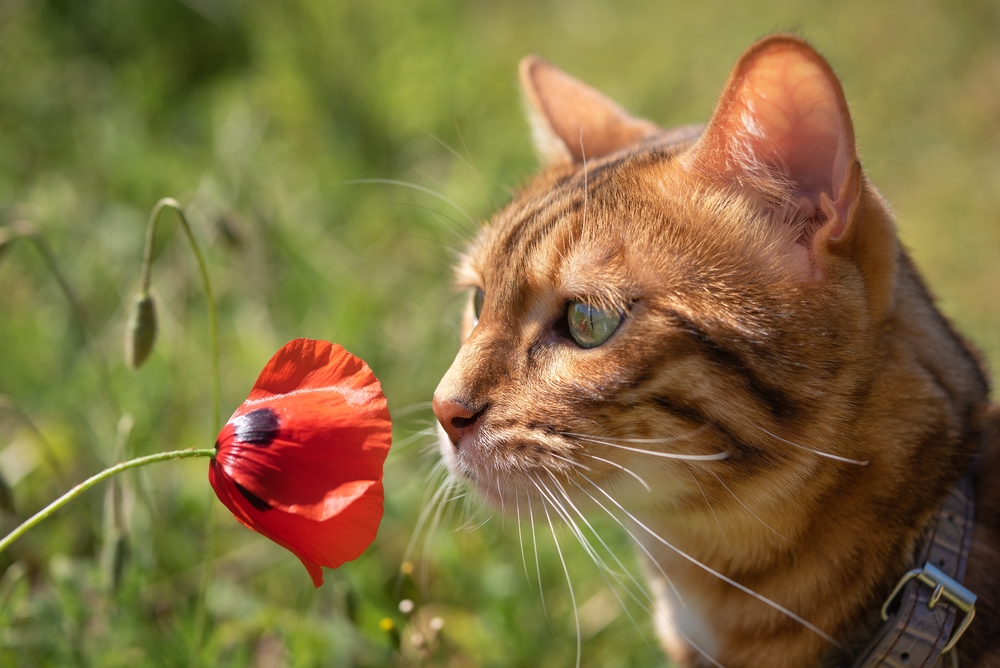
Just like with many other cat-related questions and concerns, there is no definite answer. It wouldn’t be so fun if everything was a simple yes-or-no matter, right?
Poppy flower has been included on the list of toxic plants for pets. Every part of that plant can be potentially harmful to your precious furbaby, but its seeds aren’t necessarily bad.
When consumed in moderation, poppy seeds don’t have to be dangerous to our feline friends. However, in order to be safe and cautious. I would advise you not to feed your feline any amount of poppy seeds.
Because the safe amount of poppy seeds varies from feline to feline, you can never be one hundred percent sure you have given your fluff the right amount.
So, can cats eat poppy seeds? No, they can’t. Or rather shouldn’t.
If you’re worried about the nutritional value of poppy seeds, and you fear your kitty might lack something if she skips on these dangerous seeds, please don’t worry. I assure you – your cat will be just fine if her diet doesn’t contain poppy seeds.
Poppy poisoning: what’s that?
Do you remember how in The Wizard of Oz Dorothy falls asleep in the field of poppies? Well, even though that’s just a fictional scene, the real symptoms of poppy poisoning are very similar.
We have already mentioned that a small amount of poppy seeds does not have to be harmful. However, if your kitty consumes large quantities of these seeds, that overconsumption can lead to depression, sedation, and even death.
If you believe your cat has swallowed any amount of poppy seeds, or you see her doing so, take her to the vet immediately. You have to have a professional evaluate her overall health and determine whether there are any symptoms of poppy poisoning or not.
What are the symptoms of poppy poisoning?
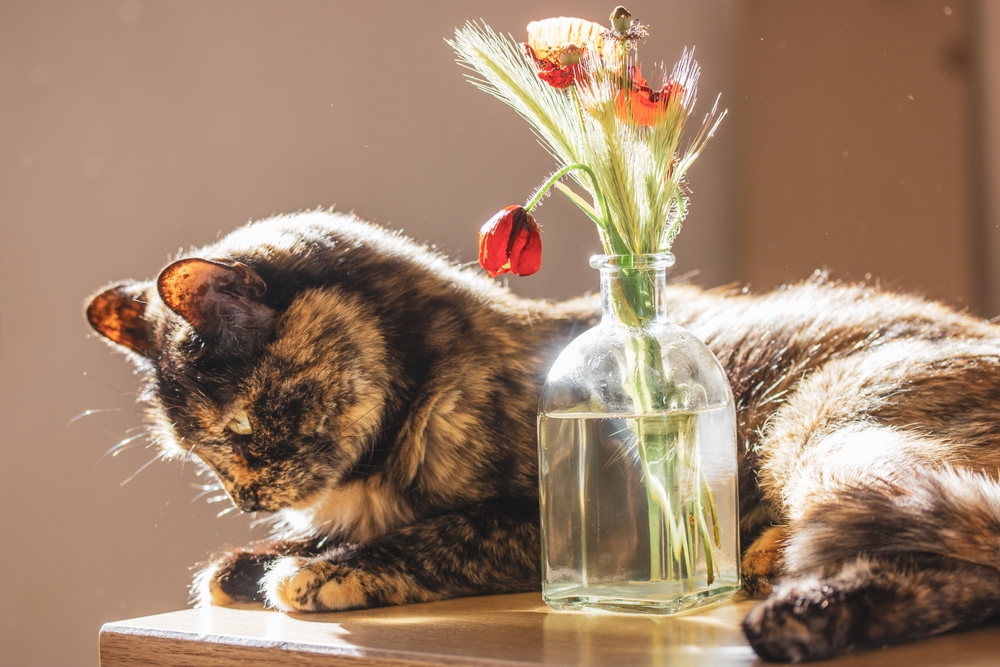
Usually, when we want to determine or exclude the possibility of certain diseases or conditions, like poisoning in this case, we make sure to carefully observe our feline friends and look for the symptoms.
Some of the most common symptoms of poppy poisoning include:
- the lack of appetite
- vomiting
- pain in the abdomen
- constriction of pupils (or miosis)
- dilation of pupils (or mydriasis)
- body tremor
- poor muscle control (or ataxia)
- general weakness
- dissociation
- euphoria or excitement
- excessive vocalization
- respiratory depression (or hypoventilation)
- slow heart rate (or bradycardia)
- depression
If you notice your kitty exhibiting any of the symptoms listed above, schedule a vet visit immediately.
What does the vet do when you suspect poppy poisoning?
Once you bring your fluff to the veterinary station, the vet will first perform a standard physical exam.
This exam includes observation of her general appearance, listening to her chest with a stethoscope (which is called auscultation), and pressing on different areas of her body to feel her organs or tissues underneath.
The vet will also inspect the general levels of alertness in your kitty and her interest in her surroundings.
Next, he will proceed with certain laboratory tests that will determine how the poison is broken down in your kitty’s metabolism.
One of the tests is a complete blood count (CBC) which is a blood test that can determine if there are any weird increases or decreases in cell count. With a packed cell volume test (PCV) the vet can determine the level of (de)hydration.
If the vet notices a slower heart rate in your cat, he can also suggest doing an EKG test, which is a test that measures the electrical activity of the heart.
How to treat poppy poisoning in felines?
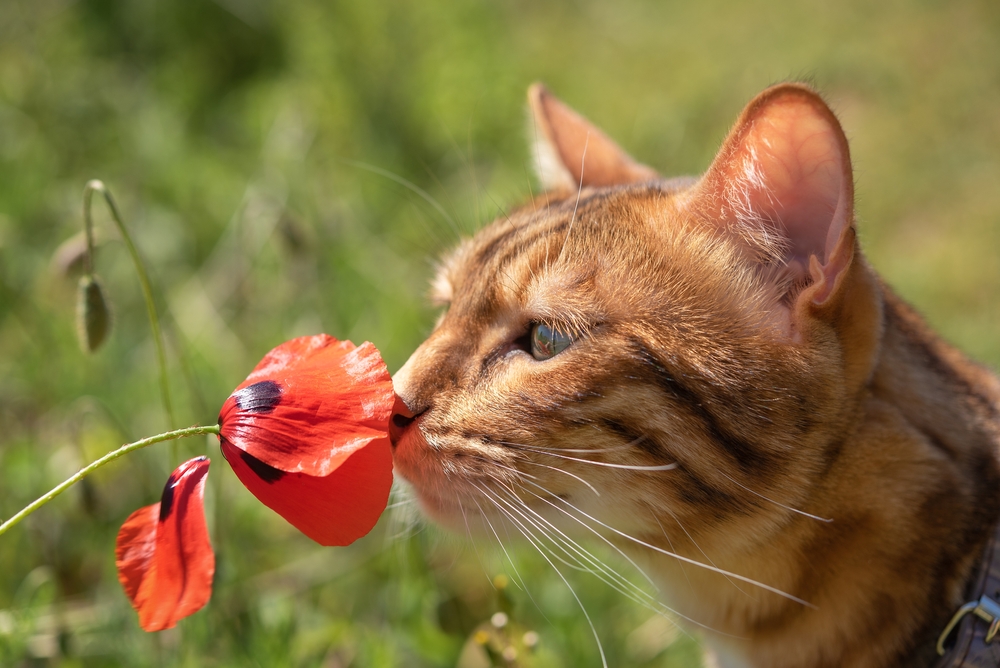
When it comes to the way you are supposed to treat poppy poisoning, the vet might first get your kitty to vomit, so she could get the poppy seeds out of her system.
He can also give her some activated charcoal as it has great detoxifying properties. He can also give her IV fluids to prevent dehydration and give her an oxygen mask or place her in an oxygen cage if she shows signs of troubled breathing.
If your kitty shows signs of depression and anxiety or appears to be under a lot of stress, make sure you put her in a nice, quiet, and dark area in order to calm her nervous system down and help her deal with the toxin remnants.
However, we do have to note that you shouldn’t do any of these treatments without consulting your vet first.
What other seeds are not off-limits for our feline friends?
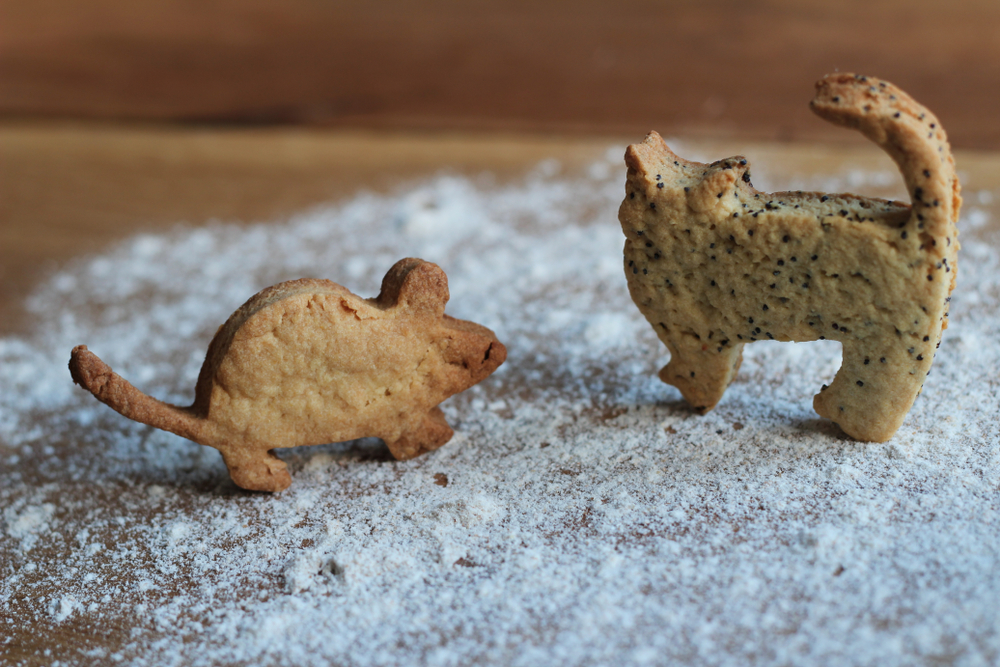
Since the answer to the question, “Can cats eat poppy seeds?” is a resounding no, we cannot help but wonder if other seeds safe for our fluffs or not.
Luckily for all of us, the majority of the seeds we use in our everyday lives are also fairly safe for our feline friends.
Seeds are rich in vitamins, like B5, B9, and E, and packed with minerals like iron, calcium, and magnesium. They are also a great source of fiber which can be extremely beneficial for your kitty’s digestive system and prevent constipation.
For example, chia seeds are low in fat but rich in amino acids, fibers, and carbs. They can be amazing for your furbaby’s immune system and great for her bones and fur. However, your cat should consume them in moderation. The general rule is to give a teaspoon of chia seeds for every 10 pounds of a cat’s weight.
Other seeds your fluff can consume include pumpkin seeds, which are rich in iron, calcium, zinc, and vitamins K and E. These seeds are also great for digestion and can help in treating intestinal worms.
Flax seeds are rich in Omega-3 and are great for treating inflammatory conditions as well as beneficial for your cat’s skin and fur.
Sunflower seeds are packed with vitamins E, B1, B5, proteins, magnesium, iron, and healthy polyunsaturated fat. When given in moderation, they can do wonders for your fluff’s digestive system.
All in all, seeds can be a great addition to your cat’s diet. But please, before you give your precious fluff anything, consult your vet about all the benefits, necessary portions, and even potential risks.
